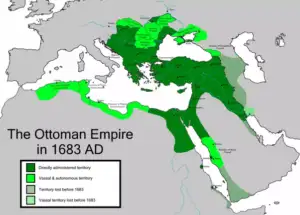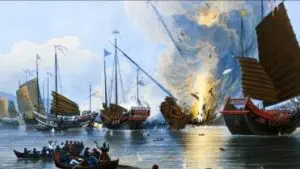Narcissism of Ideology Part II
Lessons from Turkey, China & Japan

Admiral Perry enters Tokyo Harbour threatening a naval bombardment unless his terms were met, 1853
In Part I of the Narcissism of Ideology we explored a very specific form of narcissism, that of our leaders whose ideologies, both left and right, have made them unable to learn. Through examples we saw that this meant that their political ideology turned them into narcissists as demonstrated by the fact that they cannot escape their self-created bubble of non-reality, are convinced that they are right, the facts be damned, and thus they cannot learn from their mistakes. In this way narcissism is transformed from being a personal-psychological issue to the group-sociological challenge. From this perspective it can be supposed that a society that does not learn, one that always blames other societies for their problems, has the inevitable result of the death of many of its members and its collapse. I call this “socio-narcissism”.
Today we will look at two historical examples of cultures which were so convinced of their own superiority that they were unable to learn from others or change. The result was the total collapse of the Turkish and Chinese Empires. On the other hand, Japan, which because it was shut off from the outside world for hundreds of years would have seemed a prime candidate for “socio-narcissism” was clearly not. We know this as it was the only country in the world to modernize within a generation and not be controlled by a European power. What lessons can we learn from these cultures that could help us learn and adapt to life in the 21st century?

The Turkish Caliphate’s Failed Attempts to Modernize
If the peoples of the Middle East continue on their present path, the suicide bomber may become a metaphor for the whole region, and there will be no escape from a downward spiral of hate and spite, rage and self-pity, poverty and oppression.” – What Went Wrong Bernard Lewis [1]
For centuries, the world of Islam was in the forefront of human achievement — the foremost military and economic power in the world, the leader in the arts and sciences of civilization. Christian Europe was seen as an outer darkness of barbarism and unbelief from which there was nothing to learn or to fear. The West slowly learned from Islam (and Byzantium), and then everything changed. The West won victory after victory, first on the battlefield and then in the marketplace. The turning point militarily was 1683, when the Turks failed in their attempt to conquer Vienna, although they were very, very close to victory. We, in “the West”, have a mistaken view of history that we have been dominant and more advanced than the rest of the world for many hundreds of years. Nothing could be further from the truth, as made clear by the map above.
The great British expert on the Moslem world, Bernard Lewis examined the anguished reaction of the Islamic world as it tried to make sense of how it had been overtaken, overshadowed, and dominated by the West in recent times. In a fascinating portrait of a culture in turmoil, Lewis shows how the Middle East turned its attention to understanding European weaponry, industry, government, education, and culture and desperately tried to modernize, but failed. He also describes how some Middle Easterners fastened blame on a series of scapegoats, which only means that their societies are unable to learn, blame others, cannot modernize and become text book examples of socio-narcissism. Others, in a similar fashion, asked unhelpful questions like: “Who did this to us?” Osama bin Laden, the Islamic Republic of Iran, and other fundamentalists believe that the Muslim world must stop imitating “the infidels” and that the pursuit of modernization is preventing a return to their true, original faith. As this attitude could preclude learning from other cultures, it too is a form of socio-narcissism. However, some Moslem countries are instead asking: “Where did we go wrong?” This is a healthy question to ask. The approach of blaming the West and modernization for the plight of the Muslim world “leads into a twilight world of neurotic fantasies and conspiracy theories and the like. And that has been much more popular in recent years in a large part of the region,” Lewis said. Let us hope that this formerly forward thinking culture is able to extract itself from the self-pity of socio-narcissism, to learn and change so that its people can enjoy happy and healthy lives.

China’s Catastrophic Wars with England in the 19th Century
I just finished teaching the history of how China and Japan responded in the 19th century to European attempts to dominate the Far East. What is extremely obvious is the differences in the responses of China and Japan. China’s response to aggression from the technically advanced West resulted in the “Century of Humiliation”, the collapse of the Qin Empire, decades of civil war, a deadly war with Japan and eventual conquest by the Communists, with support from Russia. These disasters started when the British tried to sell Opium into China and the Chinese tried to (understandably) stop it. Clearly the British were no more than drug lords, but drug lords with the world’s most advanced Navy. Here is a bit about the First Opium war, which began the collapse of the Qin Empire. The trade of opium was a massive market for England. Tensions between the English and Chinese were building as the trade grew. Many people in China had used the drug for medical purposes alone, yet after years of trading with England, opium ended up on the black market. This resulted in millions of Chinese people becoming addicts. The English demanded that the opium trade be legalized, a demand that was not met until much later. Lin Ze-xu, an ambassador for the Emperor of China, had been hard at work trying to rid the nation of its drug problems. He cut off all trades of opium to China, arresting anyone who sold the drug. He made over fifteen hundred arrests and confiscated over ten thousand pounds of opium. Lin burned more than twenty-thousand crates worth of opium in public. In November of 1839, England sent a fleet of battleships into Chinese waters. They destroyed several Chinese ships, inciting the First Opium War. The war went on until 1842, with England vastly overpowering the Chinese with superior weaponry and military tactics. Battles were won by the English both at sea and on land, with some battles taking place in Ningbo and Chinhai. One of the most important things for England was the ship known as the Nemesis. Seen as Her Majesty’s Navy’s trump card, the Nemesis was a steam-driven ship made entirely out of iron, something uncommon for the time. In 1842, both nations signed the Treaty of Nanking, ending the war. With this treaty, England gained control over Hong Kong and re-established trade routes between the two nations.[2] Now that you know the basic story the question becomes this: How could a tiny island nation on the other side of the world defeat what was the world’s largest and most powerful Empire? Simply put, the British had superior weaponry and tactics. This begs the next question: “How could China, once the world leader in technology who had a navy in the 15th century far superior to that of the Europeans, who invented gunpowder, paper, the compass and the printing press, become so technologically backwards when compared to the Europe of 1840? Simple, the Chinese had stopped learning. They can become socio-narcissists. They felt that they had nothing to learn from “the barbarians’ and had not kept up to date on the Scientific Revolution that had been unfolding in Europe. Their educated people only studies old documents about the outside world and focussed especially on the Chinese classics: the past is what mattered. More than that, when confronted with the reality of British military superiority they tried to improve, but failed. There was something about their thinking that did not allow them to enter the modern world. China, a world leader for thousands of years, had lost its innovative spirit. It had stopped being able to learn from others. And, sadly for us, suffered the consequences. We are all today being disturbed by the ripples from these attempts as China attempts to resurrect its Empire and once more become the centre of the world.
Japan: the first country in the world to defeat a European Military in Modern Times
What is so fascinating about Japan is that their response to the aggressions for the Western powers was exactly the opposite of Chinas. They had a culture which had kept open the door to learning from the West. Their Dutch trading partners had been bringing books about the development in European Science for hundreds of years; they even had a School specifically focussed on learning about Western Culture and its Science. Thus, when they saw what happened to China and had a very unfair trade treaty imposed upon them, they did not fight, because they knew they were going to lose. Leaders who understood that the old ways had to go took over and quickly sent their best young men overseas to learn from “the barbarians”. They modernized so well and so quickly that by 1904 they defeated the Russian Navy in a conflict. This was the first time in modern History that a European power had been defeated by a non-European one. After that, Japan got “respect” (and better trade arrangements) with the Western powers and was treated (almost) as an equal. What made the Japanese response to different from China’s? The Japan, because it had been learning from other societies (mostly China) for hundreds of years, and because they were not the powerful country in their region, was able to be self-critical, not play the blame game and to learn. They were definitely not socio-narcissists.
In conclusion, one of the less popular lessons of History is that societies are successful because they are good learners, they are not socio-narcissists. Today our society is also faced with choices to change, or attempt to maintain the status quo. We too can choose to learn new “tricks” that will enable us to adapt to a new world, or become socio-narcissists and blame others and look inwards, to try to go back to “the good old days”. Well, History is clear: that is the kiss of death. There is nothing special about us: we too can share of the fate of Turkey or China, if stop learning and adapting. Let’s hope that as the 21st century unfolds Canada is able to learn and adapt to the new world coming our way.
References
https://www.reconciliationsofnations.com/2018/12/20/first-opium-war/
Leave a Reply